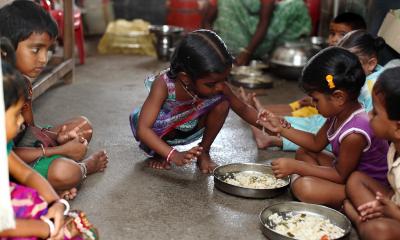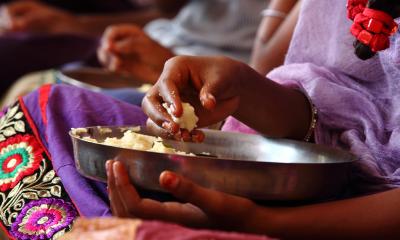
Understanding how both young women and young men experience and respond to different aspects of their family lives is central to achieving many of the targets on gender equality under Sustainable Development Goal 5, including in relation to unpaid care and domestic work, early marriage and parenthood and domestic violence.
Now in their third decade of life, many of the young people in our study have entered into marriage or cohabitation, setting up households and having children of their own. Young Lives longitudinal, mixed methods data allows us to investigate how the consequences of childhood poverty and gender inequality play out in family lives and livelihood decisions, allowing an in-depth understanding of family dynamics within households, and how widening inequalities impact young people’s transition through adolescence into adulthood.
Young Lives evidence shows there has been a profound change in the experience of adolescence over the first two decades of the 21st century. The young people in our study are likely to stay in school much longer than their parents did, delaying their entry into the labour force, and getting married and starting their own family later. However, persistent inequalities and patriarchal norms continue to influence young women’s and young men’s life choices and limit the possibilities for personal and social change.
Gender differences widen significantly during adolescence, affecting girls and boys in different ways at different times with impacts on education, early marriage and parenthood, and work. The way in which gender intersects with other inequalities, including wealth, rural location and minority status often matters most.
For example, girls' and boys' household roles become increasingly gender differentiated during adolescence, with girls spending more time on domestic chores and boys typically undertaking more paid work. Whilst there are significant country variations, gender gaps in cognitive and socio-emotional skills, particularly those associated with empowerment, also open up during adolescence, with those living in the poorest and rural areas most affected.
Gender and patriarchal norms influence transitions into young adulthood, as young people take on new roles within and outside the home. Despite an overall drop in early marriage, young women at 20 are far more likely to marry or have children than young men, particularly those from poorer households and rural areas. The transition to marital life is often particularly difficult for adolescent girls and young women, and few services are designed to meet young women's sexual and reproductive, study and training, or social support needs. In these early unions, young men typically hold greater power and influence over household resources and decision making with many women experiencing violence at some time.
Young women with strong cognitive skills are better able to secure decent paid work, particularly in Peru and Ethiopia, but this is not the case in India, due to discriminatory gender norms. Overall, women continue to earn less then young men by the age of 26 - 27, with the pay gap 70% in India, 40% in Ethiopia and around 30% in Peru and Vietnam.

Young people are having to navigate the COVID-19 pandemic and an escalating climate crisis at a critical period as they set the foundations for their adult work and family lives. Many young people in Ethiopia have also been severely affected by ongoing conflict. These crises risk exacerbating inequalities within intimate relationships and family lives, creating further social and economic divisions among this generation of youth.
The pandemic had a profound impact on young people’s family lives and livelihoods, with households tending to resort to more traditional gender roles in times of stress. Increased unpaid domestic work and care responsibilities particularly affected vulnerable girls and young women, and increased experiences of domestic violence during lockdowns, affected both young women and young men. Reduced access to sexual health and reproductive services also had a negative impact on young people.
Our future research will seek to better understand how young women and young men experience and respond to different aspects of their family lives and livelihoods, particularly in the context of navigating and building resilience to the COVID-19 pandemic and a changing climate. This will include:
- investigating the consequences of diverse pathways to marriage and parenthood;
- the competing demands of work and family life including unpaid domestic work and caring responsibilities;
- how family and fertility decisions impact opportunities for paid employment or entrepreneurship;
- and how young families respond and adapt in times of crisis including the COVID-19 pandemic, conflict and climate change.
Understanding how both young women and young men experience and respond to different aspects of their family lives is central to achieving many of the targets on gender equality under Sustainable Development Goal 5, including in relation to unpaid care and domestic work, early marriage and parenthood and domestic violence.
Now in their third decade of life, many of the young people in our study have entered into marriage or cohabitation, setting up households and having children of their own. Young Lives longitudinal, mixed methods data allows us to investigate how the consequences of childhood poverty and gender inequality play out in family lives and livelihood decisions, allowing an in-depth understanding of family dynamics within households, and how widening inequalities impact young people’s transition through adolescence into adulthood.
Young Lives evidence shows there has been a profound change in the experience of adolescence over the first two decades of the 21st century. The young people in our study are likely to stay in school much longer than their parents did, delaying their entry into the labour force, and getting married and starting their own family later. However, persistent inequalities and patriarchal norms continue to influence young women’s and young men’s life choices and limit the possibilities for personal and social change.
Gender differences widen significantly during adolescence, affecting girls and boys in different ways at different times with impacts on education, early marriage and parenthood, and work. The way in which gender intersects with other inequalities, including wealth, rural location and minority status often matters most.
For example, girls' and boys' household roles become increasingly gender differentiated during adolescence, with girls spending more time on domestic chores and boys typically undertaking more paid work. Whilst there are significant country variations, gender gaps in cognitive and socio-emotional skills, particularly those associated with empowerment, also open up during adolescence, with those living in the poorest and rural areas most affected.
Gender and patriarchal norms influence transitions into young adulthood, as young people take on new roles within and outside the home. Despite an overall drop in early marriage, young women at 20 are far more likely to marry or have children than young men, particularly those from poorer households and rural areas. The transition to marital life is often particularly difficult for adolescent girls and young women, and few services are designed to meet young women's sexual and reproductive, study and training, or social support needs. In these early unions, young men typically hold greater power and influence over household resources and decision making with many women experiencing violence at some time.
Young women with strong cognitive skills are better able to secure decent paid work, particularly in Peru and Ethiopia, but this is not the case in India, due to discriminatory gender norms. Overall, women continue to earn less then young men by the age of 26 - 27, with the pay gap 70% in India, 40% in Ethiopia and around 30% in Peru and Vietnam.

Young people are having to navigate the COVID-19 pandemic and an escalating climate crisis at a critical period as they set the foundations for their adult work and family lives. Many young people in Ethiopia have also been severely affected by ongoing conflict. These crises risk exacerbating inequalities within intimate relationships and family lives, creating further social and economic divisions among this generation of youth.
The pandemic had a profound impact on young people’s family lives and livelihoods, with households tending to resort to more traditional gender roles in times of stress. Increased unpaid domestic work and care responsibilities particularly affected vulnerable girls and young women, and increased experiences of domestic violence during lockdowns, affected both young women and young men. Reduced access to sexual health and reproductive services also had a negative impact on young people.
Our future research will seek to better understand how young women and young men experience and respond to different aspects of their family lives and livelihoods, particularly in the context of navigating and building resilience to the COVID-19 pandemic and a changing climate. This will include:
- investigating the consequences of diverse pathways to marriage and parenthood;
- the competing demands of work and family life including unpaid domestic work and caring responsibilities;
- how family and fertility decisions impact opportunities for paid employment or entrepreneurship;
- and how young families respond and adapt in times of crisis including the COVID-19 pandemic, conflict and climate change.





